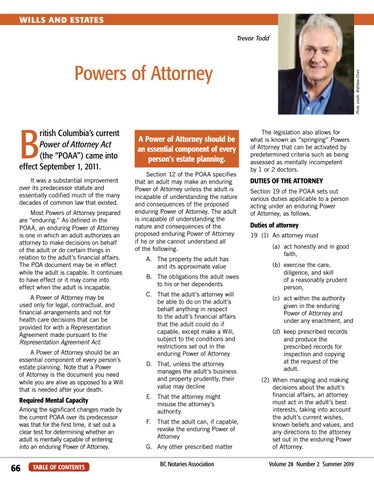WILLS AND ESTATES Trevor Todd
B
ritish Columbia’s current Power of Attorney Act (the “POAA”) came into effect September 1, 2011. It was a substantial improvement over its predecessor statute and essentially codified much of the many decades of common law that existed. Most Powers of Attorney prepared are “enduring.” As defined in the POAA, an enduring Power of Attorney is one in which an adult authorizes an attorney to make decisions on behalf of the adult or do certain things in relation to the adult’s financial affairs. The POA document may be in effect while the adult is capable. It continues to have effect or it may come into effect when the adult is incapable. A Power of Attorney may be used only for legal, contractual, and financial arrangements and not for health care decisions that can be provided for with a Representation Agreement made pursuant to the Representation Agreement Act. A Power of Attorney should be an essential component of every person’s estate planning. Note that a Power of Attorney is the document you need while you are alive as opposed to a Will that is needed after your death.
Required Mental Capacity Among the significant changes made by the current POAA over its predecessor was that for the first time, it set out a clear test for determining whether an adult is mentally capable of entering into an enduring Power of Attorney.
66
TABLE OF CONTENTS
A Power of Attorney should be an essential component of every person’s estate planning. Section 12 of the POAA specifies that an adult may make an enduring Power of Attorney unless the adult is incapable of understanding the nature and consequences of the proposed enduring Power of Attorney. The adult is incapable of understanding the nature and consequences of the proposed enduring Power of Attorney if he or she cannot understand all of the following.
A. The property the adult has and its approximate value
B. The obligations the adult owes to his or her dependents
C. That the adult’s attorney will be able to do on the adult’s behalf anything in respect to the adult’s financial affairs that the adult could do if capable, except make a Will, subject to the conditions and restrictions set out in the enduring Power of Attorney
D. That, unless the attorney manages the adult’s business and property prudently, their value may decline
E. That the attorney might misuse the attorney’s authority
F. That the adult can, if capable, revoke the enduring Power of Attorney
G. Any other prescribed matter BC Notaries Association
Photo credit: Matthew Chen
Powers of Attorney The legislation also allows for what is known as “springing” Powers of Attorney that can be activated by predetermined criteria such as being assessed as mentally incompetent by 1 or 2 doctors.
DUTIES OF THE ATTORNEY Section 19 of the POAA sets out various duties applicable to a person acting under an enduring Power of Attorney, as follows.
Duties of attorney 19 (1) An attorney must
(a) act honestly and in good faith,
(b) exercise the care, diligence, and skill of a reasonably prudent person,
(c) act within the authority given in the enduring Power of Attorney and under any enactment, and
(d) keep prescribed records and produce the prescribed records for inspection and copying at the request of the adult.
(2) When managing and making decisions about the adult’s financial affairs, an attorney must act in the adult’s best interests, taking into account the adult’s current wishes, known beliefs and values, and any directions to the attorney set out in the enduring Power of Attorney. Volume 28 Number 2 Summer 2019





















